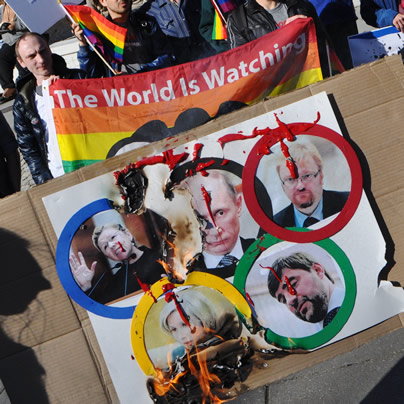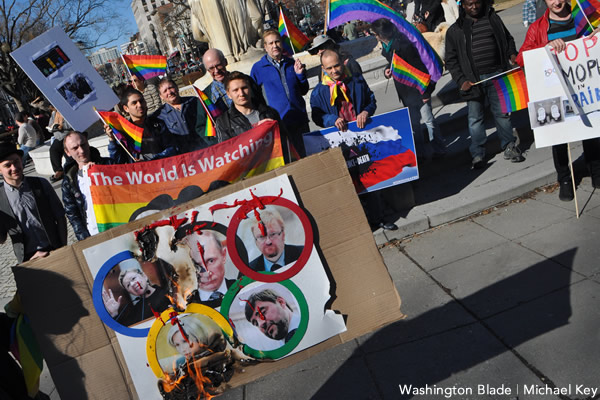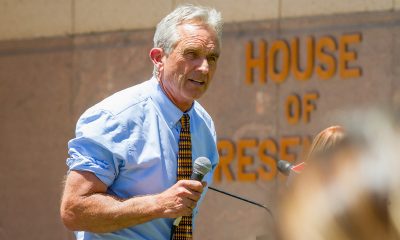National
Post-Olympic concerns over Russia LGBT rights record remain
Russian brothers and sisters ‘will not be forgotten’


Several gay rights advocates gathered at Dupont Circle on Feb. 22 to bring attention to the treatment of LGBT people in Russia. (Washington Blade photo by Michael Key)
More than 20 activists gathered in Dupont Circle on Feb. 22 to protest anti-LGBT violence and discrimination in Russia. Nearly three dozen Queer Nation members protested the U.S. Olympic Committee’s final “Road to Sochi Tour” event at New York City’s Grand Central Terminal on the same day the games ended.
Bob Costas criticized Russian President Vladimir Putin over his government’s gay rights record and a host of other issues during NBC’s primetime coverage of the Olympics on Feb. 21. These include the Kremlin’s support of Ukrainian President Viktor Yanukovych who remains in hiding after pro-government snipers last week killed dozens of protesters in Kiev, the country’s capital.
“The Sochi games are Vladimir Putin’s games from their inception to their conclusion and all points in between,” said Costas. “If they are successful on their own as appears to be the case, than at least in some corners it will help to burnish the image of a regime with much of the world takes significant issue. No amount of Olympic glory can mask those realities; any more than a biathlon gold medal, hard-earned and deeply satisfying as it is, can put out the fires in Kiev.”
Anti-gay lawmakers disrupt Moscow gay games
A number of Russian LGBT rights advocates with whom the Blade has spoken in recent weeks remain concerned authorities will expand their enforcement of the country’s controversial law banning gay propaganda to minors now that the Olympics have ended.
Elena Kostynchenko is among the 10 LGBT activists who were detained just before the games’ Feb. 7 opening ceremony as they tried to sing the Russian national anthem holding rainbow flags near Moscow’s Red Square. She told the Blade during a brief interview from the Russian capital on Tuesday she is “sure” the Kremlin will further crackdown on LGBT rights now that the games are over.
“I’m sure of it,” said Kostynchenko, adding she feels authorities will also target others who speak out against the Russian government. “They are all going to have to [worry] about something after the Olympics.”
More than 300 people from across Russia and 11 other countries are expected to take part in the Russian Open Games that are scheduled to take place in Moscow through March 2.
Elvina Yuvakaeva of the Russian LGBT Sports Federation, which organized the event alongside other Russian LGBT advocacy groups, said four venues that had agreed to host the games suddenly cancelled their agreements. The hotel where the Russian LGBT Network had planned to hold a forum also abruptly cancelled the scheduled event.
St. Petersburg Legislative Assemblyman Vitaly Milonov, who spearheaded his city’s gay propaganda ban that inspired the law Putin signed last June, denounced the Russian Open Games. The lawmaker also urged Moscow Mayor Sergei Sobyanin to cancel the event.
Retired Olympic diver Greg Louganis is among those who attended the opening of the Russian Open Games on Wednesday, but reports indicate a bomb threat disrupted them. Moscow police reportedly refused to investigate the incident and local restaurants refused to serve the participants.
“It is far beyond attempts to disrupt events by homophobic groups, but a targeted and strong decision of the authorities to not let public LGBT events happen through exerting pressure on venue owners,” said Anastasia Smirnova, an LGBT activist whom St. Petersburg police arrested alongside three others on Feb. 7 as they tried to march with a banner in support of a campaign to add sexual orientation to the Olympic charter’s anti-discrimination clause.
The Federation of Gay Games has posted a petition to Change.org that urges Sir Philip Craven, president of the International Paralympic Committee, not to attend next month’s 2014 Sochi Paralympic Games if authorities do not allow the Russian Open Games to take place.
“The Russian Open Games do not violate the [gay propaganda] law in any way,” Marc Naimark of the Federation of Gay Games told the Blade on Tuesday. “But there is clearly pressure from political sources to prevent the event from happening.”
Shawn Gaylord of Human Rights First told the Blade earlier this month during an interview from Sochi that Russian LGBT advocates also remain concerned lawmakers will once again consider a proposal that would allow authorities to take children away from their gay parents because of their sexual orientation. He met with Smirnova, Russian LGBT Network Chair Igor Kochetkov and Maria Kozlovskaya of “Coming Out” on Feb. 6 before traveling to the Black Sea resort city.
“Everyone’s always anticipated that coming back after the Olympics,” Gaylord told the Blade from Sochi. “We haven’t really heard much about that specifically. We’re still operating under the assumption it’s still something we go to be thinking about.”
LGBT Russians ‘will not be forgotten’
Gaylord told the Blade the Russian LGBT rights advocates with whom he and his Human Rights First colleagues have met remain “worried” their U.S. and European counterparts will forget about their plight because the Olympics are over. Ulrika Westerlund of the Swedish Federation for Lesbian, Gay, Bisexual and Transgender Rights, who was detained alongside Kostynchenko and other activists in Moscow on Feb. 7, said she has “also heard this concern from many of our Russian contacts.”
The Human Rights Campaign last December announced a $100,000 donation to the Russia Freedom Fund. HRC also raised money for the Russian LGBT Sports Federation during an opening ceremony viewing party it hosted in Northwest Washington.
“Our plan is to proceed in conjunction with the activists on the ground in Russia with whom we’ve been working,” HRC spokesperson Michael Cole-Schwartz told the Blade on Monday.
COC Nederland, a Dutch LGBT advocacy group, has organized a number of events over the last year to highlight the Kremlin’s gay rights record. These include a protest against Putin that took place outside his meeting with Dutch Prime Minister Mark Rutte in Amsterdam last April.
The organization was also critical of the International Olympic Committee’s decision to award the 2014 Winter Olympics to Russia in spite of the Kremlin’s controversial human rights record.
“We have been able to generate a lot of support in the solidarity actions we have organized in the run up to Sochi,” COC Nederland Executive Director Koen van Dijk told the Blade on Wednesday. “We are confident that the plight of our brothers and sisters in Russia will not be forgotten.”
Federal Government
Lambda Legal praises Biden-Harris administration’s finalized Title IX regulations
New rules to take effect Aug. 1

The Biden-Harris administration’s revised Title IX policy “protects LGBTQ+ students from discrimination and other abuse,” Lambda Legal said in a statement praising the U.S. Department of Education’s issuance of the final rule on Friday.
Slated to take effect on Aug. 1, the new regulations constitute an expansion of the 1972 Title IX civil rights law, which prohibits sex-based discrimination in education programs that receive federal funding.
Pursuant to the U.S. Supreme Court’s ruling in the landmark 2020 Bostock v. Clayton County case, the department’s revised policy clarifies that discrimination on the basis of sexual orientation and gender identity constitutes sex-based discrimination as defined under the law.
“These regulations make it crystal clear that everyone can access schools that are safe, welcoming and that respect their rights,” Education Secretary Miguel Cardona said during a call with reporters on Thursday.
While the new rule does not provide guidance on whether schools must allow transgender students to play on sports teams corresponding with their gender identity to comply with Title IX, the question is addressed in a separate rule proposed by the agency in April.
The administration’s new policy also reverses some Trump-era Title IX rules governing how schools must respond to reports of sexual harassment and sexual assault, which were widely seen as imbalanced in favor of the accused.
Jennifer Klein, the director of the White House Gender Policy Council, said during Thursday’s call that the department sought to strike a balance with respect to these issues, “reaffirming our longstanding commitment to fundamental fairness.”
“We applaud the Biden administration’s action to rescind the legally unsound, cruel, and dangerous sexual harassment and assault rule of the previous administration,” Lambda Legal Nonbinary and Transgender Rights Project Director Sasha Buchert said in the group’s statement on Friday.
“Today’s rule instead appropriately underscores that Title IX’s civil rights protections clearly cover LGBTQ+ students, as well as survivors and pregnant and parenting students across race and gender identity,” she said. “Schools must be places where students can learn and thrive free of harassment, discrimination, and other abuse.”
Michigan
Mich. Democrats spar over LGBTQ-inclusive hate crimes law
Lawmakers disagree on just what kind of statute to pass

Michigan could soon become the latest state to pass an LGBTQ-inclusive hate crime law, but the state’s Democratic lawmakers disagree on just what kind of law they should pass.
Currently, Michigan’s Ethnic Intimidation Act only offers limited protections to victims of crime motivated by their “race, color, religion, gender, or national origin.” Bills proposed by Democratic lawmakers expand the list to include “actual or perceived race, color, religion, gender, sexual orientation, gender identity or expression, ethnicity, physical or mental disability, age, national origin, or association or affiliation with any such individuals.”
Democratic Gov. Gretchen Whitmer and Attorney General Dana Nessel have both advocated for a hate crime law, but house and senate Democrats have each passed different hate crimes packages, and Nessel has blasted both as being too weak.
Under the house proposal that passed last year (House Bill 4474), a first offense would be punishable with a $2,000 fine, up to two years in prison, or both. Penalties double for a second offense, and if a gun or other dangerous weapons is involved, the maximum penalty is six years in prison and a fine of $7,500.
But that proposal stalled when it reached the senate, after far-right news outlets and Fox News reported misinformation that the bill only protected LGBTQ people and would make misgendering a trans person a crime. State Rep. Noah Arbit, the bill’s sponsor, was also made the subject of a recall effort, which ultimately failed.
Arbit submitted a new version of the bill (House Bill 5288) that added sections clarifying that misgendering a person, “intentionally or unintentionally” is not a hate crime, although the latest version (House Bill 5400) of the bill omits this language.
That bill has since stalled in a house committee, in part because the Democrats lost their house majority last November, when two Democratic representatives resigned after being elected mayors. The Democrats regained their house majority last night by winning two special elections.
Meanwhile, the senate passed a different package of hate crime bills sponsored by state Sen. Sylvia Santana (Senate Bill 600) in March that includes much lighter sentences, as well as a clause ensuring that misgendering a person is not a hate crime.
Under the senate bill, if the first offense is only a threat, it would be a misdemeanor punishable by one year in prison and up to $1,000 fine. A subsequent offense or first violent hate crime, including stalking, would be a felony that attracts double the punishment.
Multiple calls and emails from the Washington Blade to both Arbit and Santana requesting comment on the bills for this story went unanswered.
The attorney general’s office sent a statement to the Blade supporting stronger hate crime legislation.
“As a career prosecutor, [Nessel] has seen firsthand how the state’s weak Ethnic Intimidation Act (not updated since the late 1980’s) does not allow for meaningful law enforcement and court intervention before threats become violent and deadly, nor does it consider significant bases for bias. It is our hope that the legislature will pass robust, much-needed updates to this statute,” the statement says.
But Nessel, who has herself been the victim of racially motivated threats, has also blasted all of the bills presented by Democrats as not going far enough.
“Two years is nothing … Why not just give them a parking ticket?” Nessel told Bridge Michigan.
Nessel blames a bizarre alliance far-right and far-left forces that have doomed tougher laws.
“You have this confluence of forces on the far right … this insistence that the First Amendment protects this language, or that the Second Amendment protects the ability to possess firearms under almost any and all circumstances,” Nessel said. “But then you also have the far left that argues basically no one should go to jail or prison for any offense ever.”
The legislature did manage to pass an “institutional desecration” law last year that penalizes hate-motivated vandalism to churches, schools, museums, and community centers, and is LGBTQ-inclusive.
According to data from the U.S. Department of Justice, reported hate crime incidents have been skyrocketing, with attacks motivated by sexual orientation surging by 70 percent from 2020 to 2022, the last year for which data is available.
Twenty-two states, D.C., Puerto Rico, and the U.S. Virgin Islands have passed LGBTQ-inclusive hate crime laws. Another 11 states have hate crime laws that include protections for “sexual orientation” but not “gender identity.”
Michigan Democrats have advanced several key LGBTQ rights priorities since they took unified control of the legislature in 2023. A long-stalled comprehensive anti-discrimination law was passed last year, as did a conversion therapy ban. Last month the legislature updated family law to make surrogacy easier for all couples, including same-sex couples.
A bill to ban the “gay panic” defense has passed the state house and was due for a Senate committee hearing on Wednesday.
Indiana
Drag queen announces run for mayor of Ind. city
Branden Blaettne seeking Fort Wayne’s top office

In a Facebook post Tuesday, a local drag personality announced he was running for the office of mayor once held by the late Fort Wayne Mayor Tom Henry, who died last month just a few months into his fifth term.
Henry was recently diagnosed with late-stage stomach cancer and experienced an emergency that landed him in hospice care. He died shortly after.
WPTA, a local television station, reported that Fort Wayne resident Branden Blaettne, whose drag name is Della Licious, confirmed he filed paperwork to be one of the candidates seeking to finish out the fifth term of the late mayor.
Blaettner, who is a community organizer, told WPTA he doesn’t want to “get Fort Wayne back on track,” but rather keep the momentum started by Henry going while giving a platform to the disenfranchised groups in the community. Blaettner said he doesn’t think his local fame as a drag queen will hold him back.
“It’s easy to have a platform when you wear platform heels,” Blaettner told WPTA. “The status quo has left a lot of people out in the cold — both figuratively and literally,” Blaettner added.

The Indiana Capital Chronicle reported that state Rep. Phil GiaQuinta, who has led the Indiana House Democratic caucus since 2018, has added his name to a growing list of Fort Wayne politicos who want to be the city’s next mayor. A caucus of precinct committee persons will choose the new mayor.
According to the Fort Wayne Journal Gazette, the deadline for residents to file candidacy was 10:30 a.m. on Wednesday. A town hall with the candidates is scheduled for 6 p.m. on Thursday at Franklin School Park. The caucus is set for 10:30 a.m. on April 20 at the Lincoln Financial Event Center at Parkview Field.
At least six candidates so far have announced they will run in the caucus. They include Branden Blaettne, GiaQuinta, City Councilwoman Michelle Chambers, City Councilwoman Sharon Tucker, former city- and county-council candidate Palermo Galindo, and 2023 Democratic primary mayoral candidate Jorge Fernandez.
-

 District of Columbia2 days ago
District of Columbia2 days agoReenactment of first gay rights picket at White House draws interest of tourists
-

 District of Columbia2 days ago
District of Columbia2 days agoNew D.C. LGBTQ+ bar Crush set to open April 19
-

 Arizona2 days ago
Arizona2 days agoAriz. governor vetoes anti-transgender, Ten Commandments bill
-

 Africa4 days ago
Africa4 days agoUgandan activists appeal ruling that upheld Anti-Homosexuality Act












